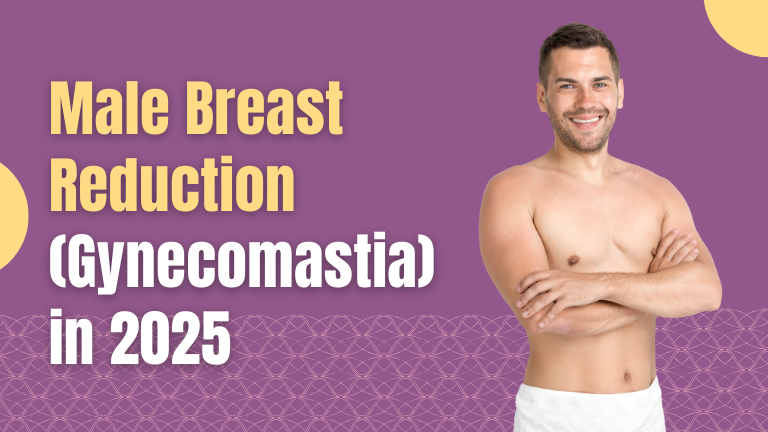Introduction
Most men are shy and self-conscious due to the breast tissue enlargement, or gynecomastia. It’s a very common problem, and most refer to it as “man breast.” It makes ordinary activities such as swimming, going to the gym, or getting dressed up in some clothes a problem. It is an embarrassing condition that causes most men to seek solutions in order to achieve a more toned and masculine chest.
As we go through 2025, the landscape of aesthetic medicine continues to shift, providing improved and more bespoke means of breast reduction in men. The once-traditional methods that suit all are no longer there; now, procedures are geared toward precise outcomes that appear natural and even speed up your recovery. If you are considering having gynecomastia treated, it is worth knowing about these new techniques and how to access a trained expert. This article will examine the most modern male breast reduction, presenting facts about new techniques, what to anticipate, and crucially, how to locate the best plastic surgeon in Chennai or a best cosmetic clinic in Chennai that specializes in this life-altering procedure. A good plastic surgeon in Chennai can actually make you feel more confident.
What is Gynecomastia?
Gynecomastia is a condition in which the breast tissue in a male becomes enlarged, but is benign. It should be distinguished from “pseudo gynecomastia,” which is mostly excess fat in the breast and is most often seen in obese men. While both may give the chest a more feminine appearance, true gynecomastia does have actual gland tissue, which is denser and typically feels like a firm or rubbery nodule over the nipple.
Gynecomastia can happen in any age of man, from a pubertal boy to an elderly man. Its common reasons are:
- Hormonal Imbalance: The most prevalent cause, namely an imbalance between estrogen (female hormone) and testosterone (male hormone). This is normal at puberty, advanced age, or following some illness.
- Drugs: Certain medications, such as those for the treatment of heart disease, ulcers, hypertension, and prostate cancer, may cause gynecomastia.
- Health Issues: Liver disease, kidney failure, thyroid disease, and certain tumors are involved.
- Genetics: A personal or family history of gynecomastia can raise the risk.
- Obesity: Although obesity may lead to pseudogynecomastia, it can lead to true gynecomastia because of enhanced secretion of estrogen in the fat cells.
Gynecomastia not only affects the body but also the psyche. Most men are shy, fearful, and avoid social encounters due to it. Treating it can be truly liberating and can completely transform self-esteem and the quality of life.
Male Breast Reduction in 2025: Trends and Advances
The field of male breast reduction (gynecomastia surgery) has evolved through the years and 2025 has seen a move towards simpler techniques, improved aesthetic outcomes, and patient-friendly recovery.
1. Minimally Invasive Surgeries Predominate
- Advanced Liposuction: When fatty tissue is the main issue, or when it is removed along with glands, today’s liposuction techniques are very accurate. Techniques like VASER liposuction (which uses sound waves) or power-assisted liposuction (PAL) help to remove fat gently and improve how the skin tightens. These methods usually use very small cuts, which result in little scarring.
- Smaller Cuts for Glandular Removal: Even when glandular tissue must be taken out, surgeons now make smaller, carefully crafted cuts, frequently on the areola’s edge (the pigmented ring around the nipple), that leave less scarring.
2. Advanced Body Contouring for the Athletic Body:
The goal now is not just to reduce size but to make the chest more defined, masculine. Surgeons in 2025 often fix gynecomastia and also contour the chest. It may include liposuction in the surrounding areas (sides, armpits) to make the pectoral muscles more defined and improve overall torso shape. It’s all about harmony and balance.
3. Personalized Treatment Plans based on Advanced Tests:
Advanced equipment is employed in contemporary clinics to precisely determine the amount of glandular tissue versus fatty tissue. This individual check assists the plastic surgeon in Chennai in modifying the surgical plan (liposuction-only, excision-only, or combination) for optimal results, ensuring the most effective and minimally invasive approach is selected for every patient.
4. Fast Recovery Plans:
- Enhanced Pain Control: Enhanced anesthesia and post-surgical pain control techniques result in less post-operative pain.
- Early Mobilization & Compression Garments: Post-surgery, patients are usually motivated to mobilize early. They are required to wear specially designed compression garments to reduce swelling, draw the skin back over the tissues, and offer support to the healing tissues so that less painful and quick recovery is possible. Patients also anticipate resting for fewer hours compared to the past.
These developments make male breast reduction in 2025 more effective, secure, and in a position to offer better-looking results, indeed remoulding the chest and, consequently, the patient’s mindset. These new methods are a sign of a best cosmetic clinic in Chennai.
The Procedure: What You Will Experience During Male Breast Reduction
The journey of achieving a flatter chest usually begins with a comprehensive consultation and proceeds through a number of significant steps:
1. Initial Consultation and Assessment: This is an important step. Your Chennai plastic surgeon will examine your body, review your medical history, hear your concerns, and see how much glandular tissue you have in relation to fat. They can draw blood or use imaging (mammograms) to ensure there are no other medical indications. This consultation decides the optimal method of surgery for your case and establishes realistic expectations.
2. Anesthesia: Male breast reduction surgery is typically performed under general anesthesia, so you’ll be under during surgery. Occasionally, for small repairs, local anesthesia with sedation may be employed. Your anesthesiologist and surgeon will discuss it with you.
3. Surgical Techniques: The method employed relies on the primary category of tissue:
- Liposuction: If the primary issue is one of too much fat, liposuction by itself may be sufficient. Tiny tubes are placed inside the tiny incisions to remove the fat. This results in very minimal scarring.
- Excision (Surgical Removal): This is performed when there is a lot of glandular tissue or excess skin. The physician then proceeds to have it removed. They generally cut along the edge of the areola or along the natural contours of the chest. This allows the surgeon to eliminate glandular tissue, excess skin, and in some instances, even relocate the nipple to make it appear natural. This process is frequently used for extreme cases of gynecomastia.
- Combination: More often, though, a mixture of liposuction (fat extraction) and excision (elimination of glandular tissue and potentially redundant skin) is employed to create the optimal form.
4. Duration of Surgery: The surgery takes approximately 1 to 3 hours. This varies with the complexity of the case and the technique employed.
Results and Recovery: Your Road to Fresh Confidence
Recovery from male breast reduction is usually tolerable, and results are not instantaneous, although the change will be dramatic.
- Right After Surgery: You can likely expect to have a bandage on your chest and a compression vest. You may have some bruising, swelling, and some pain, which can be managed with pain medication your doctor prescribes.
- Average Recovery Schedule:
- First Few Days: Rest is crucial. Avoid strenuous activities. You’ll wear a compression garment almost constantly.
- 1-2 Weeks: Swelling and bruising start to resolve in most patients. Most are able to go back to light, easy work by week one.
- 3-4 Weeks: Gradually resume light exercise. You may still wear the compression garment but perhaps not as frequently.
- 6-8 Weeks: The majority of swelling should have completely gone and you can normally resume all normal physical activity, including heavy exercise.
- When to See Final Results: Once the swelling disappears, you would be able to see some initial improvements, but the final shape would usually show up in 3 to 6 months when the final swelling disappears and the skin settles into the new shape. The scars would initially be red and lumpy but would recede and turn flat in 6-12 months.
- Longevity of Outcomes: The outcomes of male breast reduction surgery usually last for a long time. Once the glandular tissue is excised, it doesn’t tend to come back. But if there is severe weight gain or some hormonal alteration (such as due to medication or new disease), it can cause some fatty tissue to recur.
The best advantage, aside from the physical transformation, is generally an enormous boost in confidence. The patients are more comfortable in their attire, more assured when they are interacting with other individuals, and they have a sense of new masculinity. The psychological liberation is one of the overriding reasons why people get this procedure done.
Who would be a good candidate for gynecomastia in 2025?
Not all men with breast enlargement are suitable for surgery. A good candidate usually has the following characteristics:
- Fixed Weight: The candidate should be close to or at his or her ideal body weight, since significant weight changes post-surgery may affect outcomes.
- Non-Smoker: Smoking can complicate recovery and raise risks during surgery.
- Good General Health: No illness that would increase risks of operation or prevent healing.
- Realistic Expectations: Understanding that surgery can significantly enhance form but sometimes cannot provide “perfect” outcomes.
- Emotional Maturity: Teenagers would prefer that breast growth be regular before they undergo the procedure.
- Persistent Gynecomastia: If non-surgical interventions, such as life-style changes or medication adjustment, have not been successful.
You require a proper check-up with an expert plastic surgeon in Chennai who can determine whether you are a suitable candidate.
Selecting Your Specialist: How to Identify the Best Plastic Surgeon in Chennai for Gynecomastia
Male breast reduction is a serious personal choice, and getting the right surgical team is the key to safety and satisfaction. It is a specific procedure that requires not only surgical technique but an aesthetic sense of how a man’s chest is supposed to appear.
When male breast reduction is under consideration, the best plastic surgeon in Chennai must be determined. Here is what you must do:
- Board Certification: Ensure your plastic surgeon is board-certified in plastic surgery. This indicates that they have undergone rigorous training, have sufficient experience, and adhere to ethical standards.
- Specialized Experience: Find a plastic surgeon in Chennai who has considerable experience performing the gynecomastia surgery. Ask the surgeon how many patients they have treated for this surgery and ask to view before-and-after photos of their patients who have undergone gynecomastia surgery.
- Clinic Accreditation & Facilities: The surgeon must operate from a certified surgical center to ensure safety, cleanliness, and appropriate equipment. A good Plastic Surgeon in Chennai is usually associated with a good cosmetic clinic in Chennai or the top cosmetic clinic in Chennai.
- Patient Reviews and Testimonials: Online reviews and talking to others can give helpful information about what other patients think of the surgeon and the clinic.
- Personalized Consultation: A well-established surgeon will have a detailed consultation, hear your concerns, discuss all appropriate options, review possible risks and complications, and present a clear treatment plan based on your individual anatomy and objectives. This is where you can determine if they are the best cosmetologist in Chennai for you.
- Technology and Techniques: Inquire about the actual techniques and devices they utilize (e.g., VASER liposuction, specific incisions) and how they benefit you.
- Aesthetic Alignment: You must be comfortable with your surgeon’s concept of beauty and have faith that they will be able to deliver the natural-appearing, male chest contour that you desire. Do not hesitate to visit various aesthetic clinics in Chennai or cosmetology clinics in Chennai to get additional consultations.
If you make the effort to find a good and experienced plastic surgeon in Chennai, you greatly enhance your chances of a successful outcome and a good experience.
Conclusion
Male breast enlargement, or gynecomastia, is a frequent issue that can dramatically impact a man’s self-confidence and lifestyle. As we enter 2025, the field of male breast reduction has improved and simpler options to assist men in having a more masculine chest contour. These involve enhanced liposuction techniques and quicker recovery protocols, with the goal of natural outcomes with minimal time off.
Male breast reduction not only transforms the body, but it also significantly enhances self-confidence and self-esteem. It is therefore an extremely pleasing procedure for the majority of men. If you are considering the process, the single most significant thing you can do is locate the correct specialist. By doing your research and selecting the best plastic surgeon in Chennai and a reputable cosmetic clinic in Chennai with an established history of gynecomastia, you can take a big step towards your look goals and confidence.
FAQs
- Does gynecomastia surgery hurt?
All patients experience mild to moderate pain after gynecomastia surgery, which can be managed with pain medication that can be prescribed by the physician. Pain would improve significantly in a few days.
- When can one recover from male breast reduction?
Most patients can return to light, easy work in 3-7 days. Heavy exercise and heavy lifting are generally not permitted for 4-6 weeks. Complete recovery and final result typically happens within 3-6 months when swelling completely resolves.
- Will the outcome of gynecomastia surgery be permanent?
Yes, individuals generally believe the results are permanent since the glandular tissue that was removed never regrows. But if a person gains a significant amount of weight or has hormonal shifts from new medical conditions or medications, it can trigger some fatty tissue to return in that area.
- Will there be noticeable scarring following gynecomastia surgery?
Surgeons in 2025 strive to reduce scarring. Scars are usually small and accurately situated, often on the edge of the areola. Scars may be permanent, but they lighten considerably over 6-12 months and are harder to see.
- Will gynecomastia reappear after surgery?
True glandular gynecomastia recurrence is uncommon if proper surgery is done. If new breast enlargement does occur, it will more likely be due to significant weight gain (leading to fat accumulation) or changes in new hormonal imbalances due to medical condition or medication.




